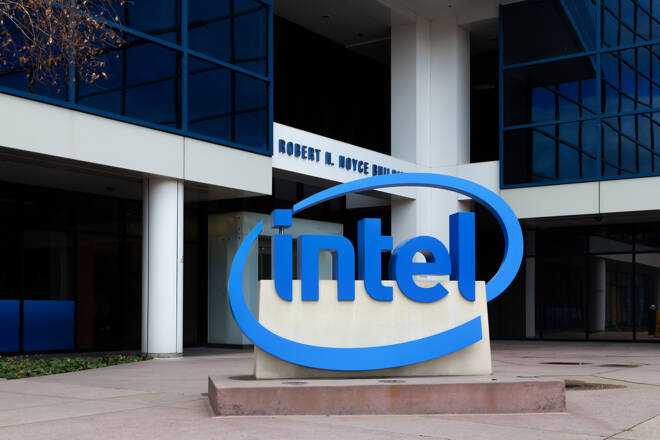Advertisement
Advertisement
Intel (INTC) Tumbles as Early 2024 Forecast Underwhelms Investors
By:
Intel (INTC) tops forecasts but Q1 2024 outlook and seven-quarter revenue rebound face AI and manufacturing challenges, testing investor confidence.
Key Points
- Intel exceeds EPS and revenue forecasts, beats Wall Street.
- Q1 2024 outlook falls short, raising investor concerns.
- Strategy focuses on AI, chip manufacturing amid market shifts.
- Stock down 5% in After Hours market.
Intel Earnings Review and Forecast
Intel (INTC) shares experienced a downturn in after-hours trading on Thursday following the company’s first-quarter forecast for 2024, which fell short of analysts’ expectations. Despite this, Intel’s latest quarter results exceeded Wall Street predictions.
Earnings and Revenue Beat
Intel reported an adjusted EPS of 54 cents, surpassing the anticipated 45 cents. Revenue reached $15.4 billion, exceeding the expected $15.15 billion. This performance marks a significant improvement, breaking a seven-quarter streak of declining revenue.
First Quarter 2024 Outlook
However, the outlook for the first quarter of 2024 is less optimistic. Intel predicts an EPS of 13 cents on sales between $12.2 billion and $13.2 billion, significantly lower than the LSEG consensus of 33 cents per share on $14.15 billion in revenue.
Intel’s Strategic Focus
Under CEO Pat Gelsinger’s five-year plan, Intel aims to compete with Taiwan Semiconductor Manufacturing Company in manufacturing services and enhance its own branded chips. The company is also streamlining through workforce reductions and divestitures, including spinning off its programmable chip unit and making Mobileye an independent entity.
Segment Performance
The Client Computing group, Intel’s largest division, reported a 33% increase in sales to $8.8 billion. However, the Data Center and AI segment saw a 10% decline in sales, totaling $4 billion. Intel’s foundry services showed a 63% annual revenue increase, albeit from a smaller base.
Pre-Report Estimates and Market Reaction
Before the earnings report, Intel’s stock had risen 65% over the past year, outperforming the S&P 500 index. Analysts had high expectations, bolstered by strong Q3 results and strategic initiatives in AI and CPU businesses. However, the forecasted revenue decline for the full year and weaker datacenter and client computing group performance may temper investor enthusiasm.
Short-Term Market Forecast
Given the mixed results – a strong earnings beat but a cautious outlook for Q1 2024 – the report appears bearish for Intel shares in the short term. Investors are likely to react cautiously, focusing on the challenges in the datacenter segment and the broader PC industry, despite Intel’s strategic shifts and cost-cutting measures. The market will closely monitor Intel’s execution of its long-term strategy, balancing immediate financial pressures with the potential for future growth in AI and chip manufacturing.
About the Author
James Hyerczykauthor
James Hyerczyk is a U.S. based seasoned technical analyst and educator with over 40 years of experience in market analysis and trading, specializing in chart patterns and price movement. He is the author of two books on technical analysis and has a background in both futures and stock markets.
Advertisement
